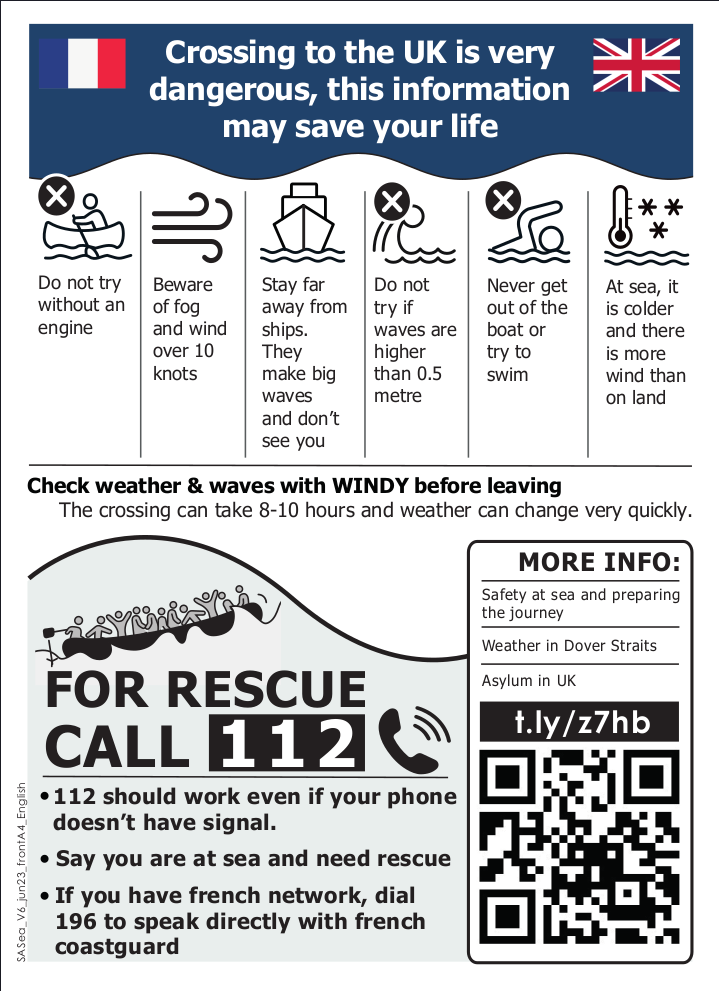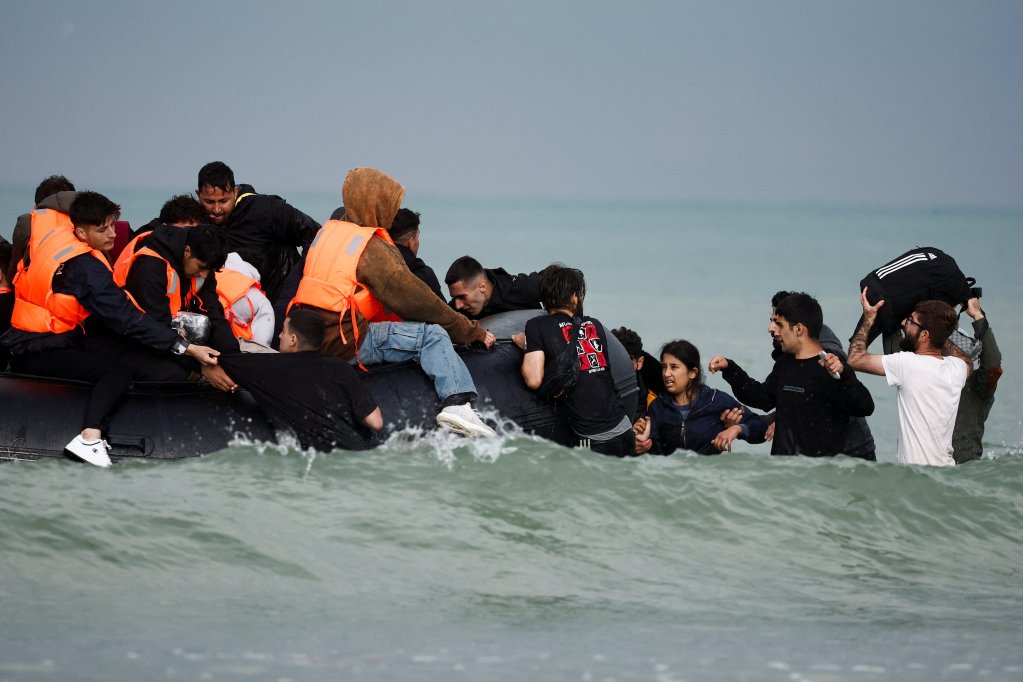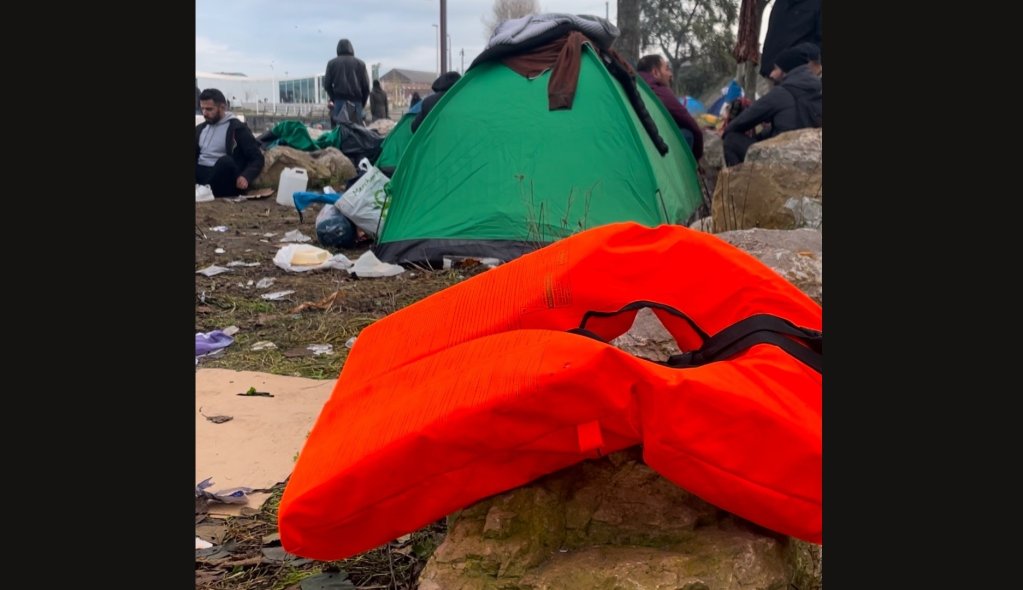More than 70 migrants have died trying to cross the Channel from France to England this year. Boat departures from the French coast are becoming more chaotic and risky, say aid groups and maritime authorities.
By Charlotte Boitiaux, special correspondent in Calais
Myriam and her daughter Melody, aged 6, have attempted to cross the Channel to reach England 12 times. To be precise: they have tried to board an inflatable boat 12 times, during their two-month stay in the area of Grande-Synthe, not far from Calais.
For the little girl who doesn’t know how to swim, it was a hellish situation. "I carry Melody on my back when we enter the water because the sea can be up to my waist," said Myriam, demonstrating with her hands how the sea would reach her chest. "Sometimes, a stranger helps us and carries Melody on his shoulders to the boat."
Melody grinned as she ate a Nutella sandwich outside the Adra association’s food distribution point. "She used to be very anxious and she would cry when we had to get into the water. Now it is better; she's brave and she knows we have no choice," said Myriam, hugging her daughter to her.
Myriam didn't talk about the times they failed to cross, except for mentioning repeatedly the heavy police presence, which "prevented her from boarding," and the smuggler’s "overloaded boats," which forced her to give up.
Crossings that 'go off the rails'
Myriam isn’t the only one who has tried and failed to cross the Channel multiple times. Many of the migrants in Calais and Dunkirk have experienced two to three, sometimes more, unsuccessful departures. The causes are numerous: overcrowded vessels, clashes between the migrants while boarding, and violence on the part of the French police.
"What is happening is dramatic: cases of distress are happening earlier and earlier – as soon as the migrants arrive on the beach or in the water," said Flore Judet, from the Calais-based association Auberge des migrants. "Migrants drown [at sea] but they are also crushed and suffocated by others."

The crossings have "completely gone off the rails," said Célestin Pichaud, from Utopia 56, especially with the "excessive" militarization of the maritime border. "Police are now firing tear gas into the boats or using defensive bullet launchers (LBD)," which is a potentially lethal weapon. "We are also witnessing an increase in police forces along the coast, in drones [and] and in surveillance cameras."
Migrants are therefore taking increasing risks to reach England. They travel farther south, towards Boulogne-sur-Mer and even Dieppe, where "the crossing distance [to reach the English coast] is multiplied by three." They sprint into the water, without being properly prepared.
"The boats are already ultra-dangerous, and not adapted for these crossings. It can be even worse if the rubber tubes are badly inflated or if the double bottom is not properly installed," said Pichaud.
Yet the migrants aren’t giving up, and the tragedies continue. Over 70 migrants have died this year trying to cross the Channel from France to England – a record-breaking figure which is higher than in the previous five years combined.
Read AlsoChildren survive cold and dangerous boat crossing to reach UK
Smugglers taking greater risks
People smugglers are also responsible for the elevated death toll, said French maritime authorities for the Channel and North Sea (Premar). The smugglers overload the vessels, which have become limited in number after police cracked down on numerous networks. The dangerously overcrowded boats are in turn increasingly prone to shipwrecks at sea. "They [the smugglers] push the limits," said a Premar spokesperson, adding, "a person can sink in a few seconds if they don't know how to swim." The rule applies even near the shore. Most of the deaths in 2024 have occurred less than 300 meters from the coast.
French rescue services have had to adjust their working method. Over 5,600 people were rescued in the Channel in 2024, according to the French authorities. "I can't say this is unprecedented, but the period is intense," said the spokesperson.

"There is a clear trend towards risk-taking in the Channel [...] Passengers are less and less equipped with survival equipment, such as life jackets [...] The coastal strip is extremely dangerous with tides that quickly rise, currents, rocks, and wind."
Certain migrants have been taken by surprise by the tides, which make the water rise rapidly and create stronger sea currents and a more dangerous sea. "In a few seconds, my feet were no longer touching the seabed. I was struggling... I saw people calling for help and then disappearing into the water," said Mohamad, a young Iraqi in his twenties, who remains traumatized by his attempt to cross the Channel.
Read Also'My father disappeared in the Channel': A survivor recalls migrant boat sinking off Calais
'I have no choice'
Buying a life jacket has become essential for some migrants. "We know it's dangerous, we know the smugglers don't provide them, so we equip ourselves," said a Syrian, showing the fluorescent orange life jacket that he purchased for about 40 euros.

Myriam, for her part, doesn't have a vest. She has no savings. She paid her smuggler 4,000 euros to reach the English coast. This price includes the crossing for her daughter Melody, her sister and herself. "I know the crossing is risky. I have no choice, I've been deported from Switzerland, and France doesn't want us because I'm 'Dublined', [the assessment of her asylum request depends on another European Union country, editor’s note], so I'm going to England. I have an uncle who is waiting for me there."
She doesn't plan on jumping on a truck heading to the UK. "If you have a problem in a truck, nobody hears you... I tell myself that at least in the water, the French authorities would be able to help us in case of a problem."
The Premar has six patrol vessels, including the Abeille Normandie, which scout the Channel to save lives. Myriam is counting on them. "[The smugglers] tell us [these vessels] stay close to the small boats. If it’s true, we have a chance of being saved."
Read AlsoMigrants in Calais: 'The UK is our last hope'
